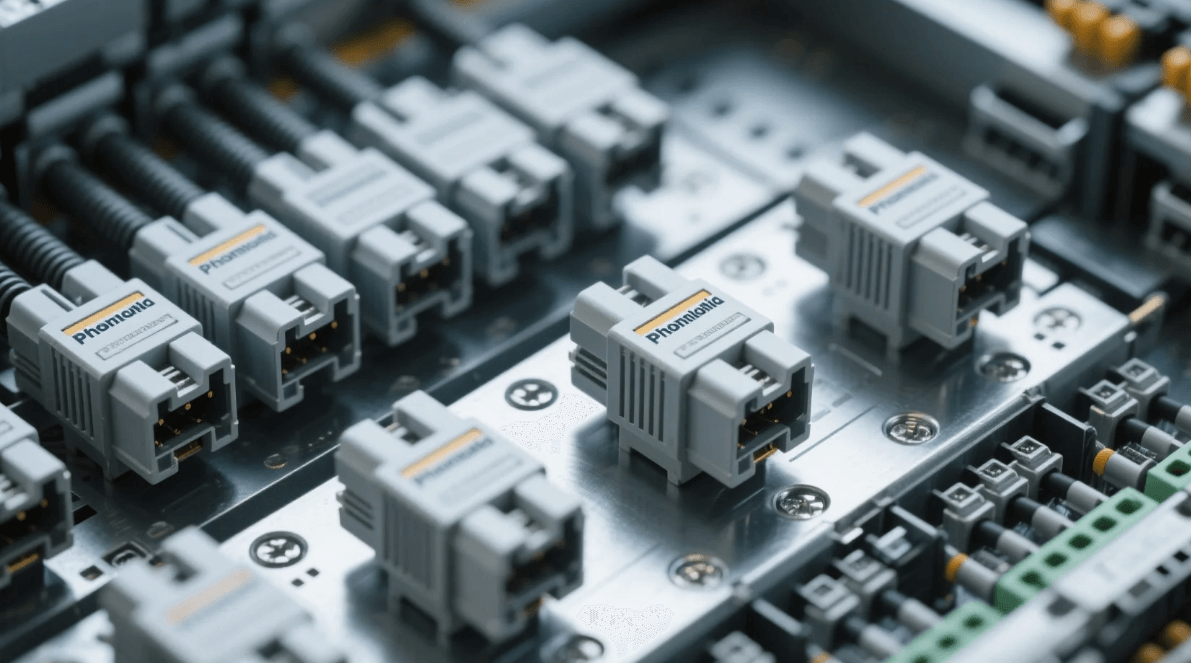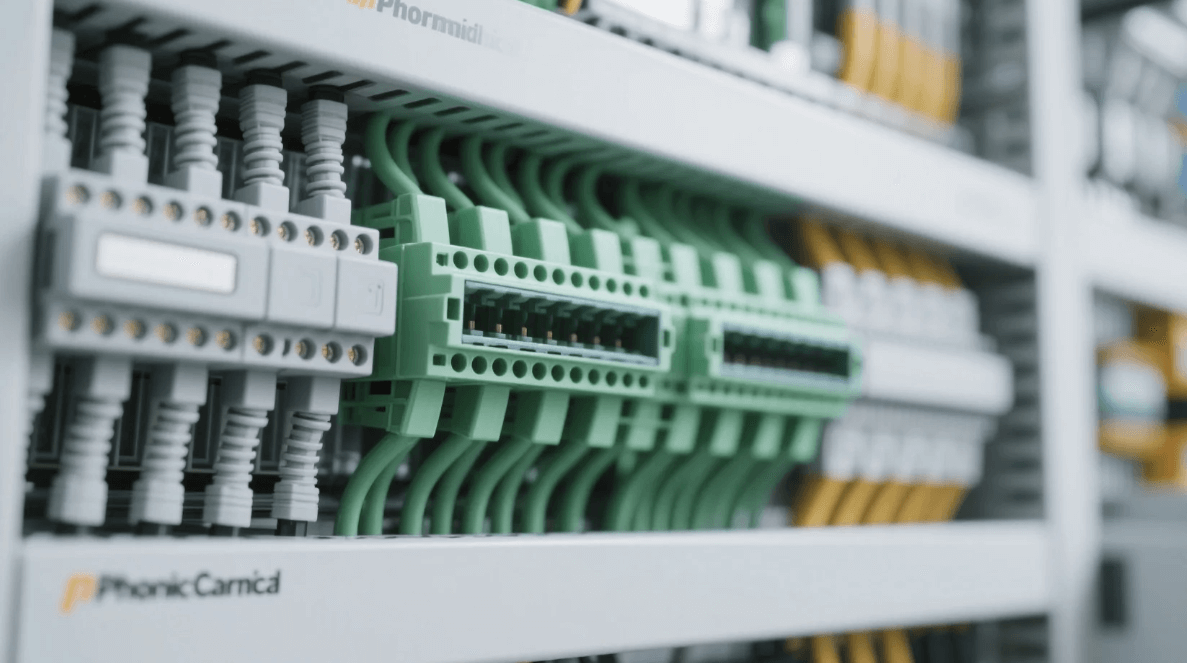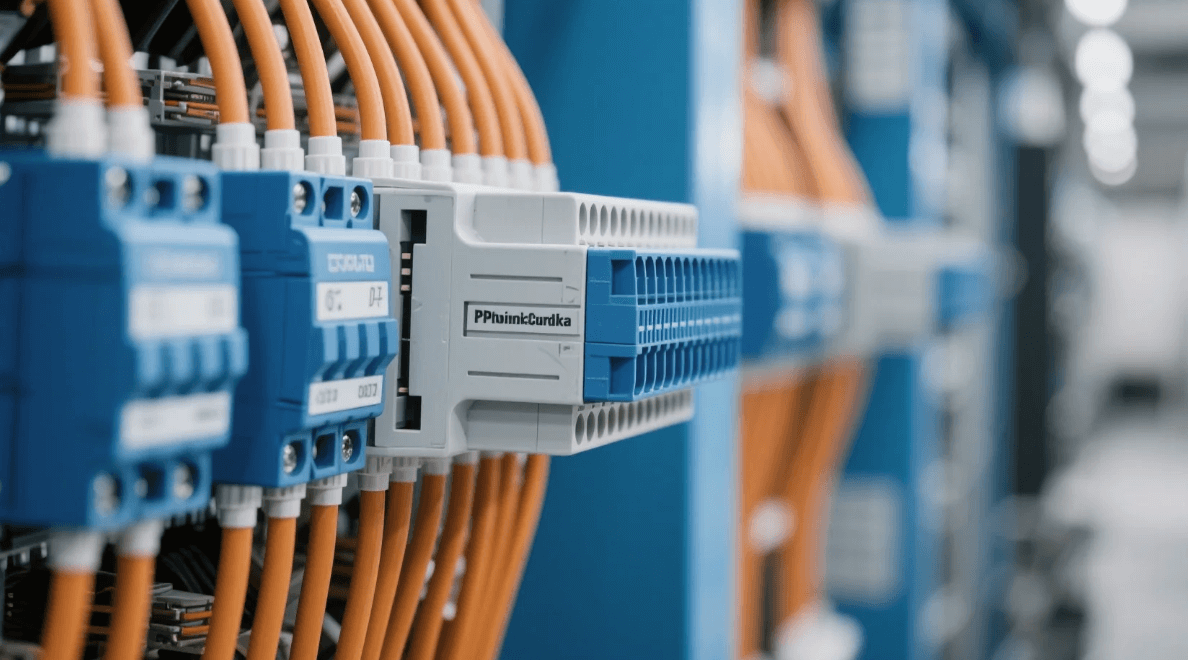Phoenix Contact-Steckverbinder für die Industrieautomation: 7 wichtige Vorteile und Anwendungen

Einführung: Intelligente Fabriken mit präziser Konnektivität versorgen
In der modernen Elektrische Prozesssteuerung und AutomatisierungSichere und effiziente Verbindungen sind der Grundstein für betrieblichen Erfolg. Von rauen Fabrikhallen bis zu Hochgeschwindigkeits-Produktionslinien, Phoenix Contact Steckverbinder für die industrielle Automatisierung bieten außergewöhnliche Leistung und Zuverlässigkeit. In diesem Artikel werden ihre wichtigsten Merkmale, praktischen Anwendungen und Implementierungsstrategien erläutert, die Ingenieuren und Automatisierungsspezialisten wertvolle Einblicke bieten.
Übersicht der Phoenix Contact-Steckverbinder für die Industrieautomation
Was zeichnet diese Steckverbinder aus?
Phoenix Contact verfügt über mehr als vier Jahrzehnte Erfahrung in der elektrischen Verbindungstechnik. Ihr Steckverbindersortiment ist auf die besonderen Herausforderungen in industriellen Umgebungen ausgerichtet:
- Modularer Aufbau: Die Komponenten können für spezifische Signal-, Strom- und Datenanforderungen zusammengestellt werden.
- Robuste Konstruktion: Die Gehäuse widerstehen Vibrationen, Korrosion und extremen Temperaturen.
- Werkzeuglose Montageoptionen: Schnelle Installation ohne Spezialwerkzeug, dadurch weniger Ausfallzeiten.
Produktfamilien und Kategorien
Hochbelastbare Steckverbinder (HDC)
- Ausgelegt für hohe Ströme und Spannungen.
- Abgedichtet nach IP65/IP67 für abwaschbare Umgebungen.
- Ideal für Motor und Stromverteilung.
Industrie-Steckverbinder (IBC)
- Kompakter Formfaktor.
- Einrastende Verriegelungssysteme.
- Geeignet für die Verdrahtung von Sensoren und Aktoren.
M12- und M8-Rundsteckverbinder
- Standardisierte Schnittstellen für Sensoren, Ventile und Feldgeräte.
- Erhältlich in A-, B-, D- und X-Kodierung für Ethernet- und Feldbussignale.

Hauptmerkmale und technische Vorteile
Hohe Widerstandsfähigkeit unter rauen Bedingungen
Produktionsanlagen sind oft extremen Temperaturen, Feuchtigkeit und chemischen Einflüssen ausgesetzt. Phoenix Contact-Steckverbinder für die industrielle Automation PA-, Edelstahl- und TPU-Materialien verwenden, um zu widerstehen:
- Temperaturbereich von -40 °C bis +125 °C.
- Chemische Mittel in Reinigungs- und Herstellungsprozessen.
- Mechanische Belastung durch Vibration und Schock.
Verbesserte Datenübertragung
Da Industrie 4.0-Initiativen datenzentrierte Abläufe vorantreiben, müssen Steckverbinder Hochgeschwindigkeitssignale unterstützen:
- Cat6A RJ45-Einsätze für 10-Gbit/s-Ethernet.
- X-Codiert M12 für industrielles Ethernet mit bis zu 10 Gbit/s.
- Integrierte EMV-Abschirmung zur Minimierung von elektromagnetischen Störungen.
Vereinfachte Installation und Wartung
Zeit ist Geld in automatisierten Anlagen. Die Konnektoren von Phoenix Contact bieten:
- Steck- und Federkraftklemmen für werkzeuglose Verdrahtung.
- Farbcodierte Gehäuse um Verdrahtungsfehler zu vermeiden.
- Auswechselbare Einsätze die eine sofortige Wartung ohne vollständige Demontage ermöglichen.

Anwendungen in der elektrischen Prozesssteuerung und Automatisierung
Schnittstellen zu Werkzeugmaschinen
Die präzise Steuerung von CNC-Maschinen hängt von hochwertigen Verbindungen ab:
- Rückmeldesensoren für Achsenpositionen verwenden geschirmte M12-Stecker.
- Motorantriebe und Leistungselektronik integrieren HDC-Steckverbinder zur sicheren Energieübertragung.
Verteilte Steuerungssysteme (DCS)
In großen Verarbeitungsanlagen werden verteilte Feld-E/A-Module über steckbare Anschlüsse verbunden:
- Der schnelle Austausch von Modulen reduziert die Ausfallzeiten des Systems.
- Die kompakte Bauweise ermöglicht eine engere Montage an den Geräten vor Ort, was die Kosten für die Verkabelung reduziert.
Robotik und Bewegungssteuerung
Schnelle und zuverlässige Datenverbindungen sind für die Roboterkoordination von entscheidender Bedeutung:
- X-Codiert M12 Kabel erhalten die Signalintegrität für die Echtzeitsteuerung.
- Steckverbinder, die für Millionen von Steckzyklen ausgelegt sind, unterstützen den täglichen Betrieb.
Prozessüberwachung und Sicherheitssysteme
Sensoren und Sicherheitsrelais werden häufig in abgelegenen oder gefährlichen Bereichen eingesetzt:
- Explosionsgeschützte Steckervarianten gewährleisten die Einhaltung von ATEX und IECEx.
- Faseroptische Steckverbinder isolieren Signale in elektrisch empfindlichen Bereichen.
Implementierungsstrategien für maximalen ROI
Standardisierung von Steckertypen
Durch die Auswahl eines Kernsatzes von Steckerfamilien vereinfachen Unternehmen die Lagerhaltung und Schulung:
- Lagerhaltige M12 A- und X-kodierte Stecker für allgemeine E/A.
- Behalten Sie HDC-Varianten für Leistungsmodule und Antriebe bei.
- Schulung des Wartungspersonals in den üblichen werkzeuglosen Installationsverfahren.
Lebenszyklusmanagement und vorausschauende Wartung
Implementierung von RFID-fähigen Steckverbindern und Modulen zur Verfolgung der Nutzungshistorie. Eine solche digitale Kennzeichnung:
- Warnt die Techniker, wenn sich die Steckzyklen dem Ende der Lebensdauer nähern.
- Ermöglicht proaktiven Austausch und vermeidet ungeplante Ausfallzeiten.
Integration mit Kabelmanagementsystemen
Die Organisation der Kabel reduziert Installationsfehler und vereinfacht die Fehlersuche:
- Verwenden Sie neben den Steckverbindern auch die Kabelkanäle und Beschriftungssysteme von Phoenix Contact.
- Verwenden Sie Biegebegrenzer, um die Integrität des Kabels bei häufigen Bewegungen zu erhalten.
Zukünftige Richtungen und Innovationen
Miniaturisierung und erhöhte Dichte
Da die Schaltschränke immer voller werden, steigt die Nachfrage nach kleineren, aber robusten Steckverbindern:
- Mikro-M8-Steckverbinder der nächsten Generation für kompakte Sensornetzwerke.
- Multi-Pin-Module mit hoher Dichte, die Strom und Daten in einem einzigen Gehäuse unterstützen.
Intelligente Steckverbinder und IIoT-Integration
Neuere Lösungen integrieren die Diagnose in die Steckverbinder:
- Überwachung von Temperatur, Luftfeuchtigkeit und Stromstärke in Echtzeit.
- Cloud-basierte Dashboards, die IIoT-Plattformen zur Vorhersage von Ausfällen nutzen.
Nachhaltiges und umweltfreundliches Design
Phoenix Contact treibt die Entwicklung recycelbarer Materialien und energieeffizienter Fertigung voran:
- Biokunststoffe in unkritischen Gehäusen.
- Verringerung des Verpackungsmülls durch modulare Kits.
Schlussfolgerung: Erfolg mit Phoenix Contact verbinden
Durch die Wahl Phoenix Contact-Steckverbinder für die industrielle Automationgewinnen die Unternehmen:
- Unerreichte Zuverlässigkeit unter extremen Bedingungen.
- Rationalisierte Installation und Wartung.
- Zukunftssichere Daten- und Energielösungen.
Die Optimierung der Konnektivität ist der Schlüssel zum Erreichen von Spitzenleistungen in Elektrische Prozesssteuerung und Automatisierung. Die Investition in qualitativ hochwertige Steckverbinder fördert die langfristige Produktivität und Sicherheit.
FAQ
Q1: Wie hoch ist die maximale Stromstärke für HDC-Steckverbinder?
A: Heavy-Duty-Steckverbinder unterstützen bis zu 40 A pro Kontakt, je nach Kontaktgröße und Konfiguration.
F2: Können Phoenix Contact-Steckverbinder faseroptische Signale verarbeiten?
A: Ja, faseroptische Einsatzmodule sind für ATEX-zertifizierte Reinigungs- und Hochspannungsumgebungen erhältlich.
F3: Sind diese Anschlüsse mit Kabeln anderer Hersteller kompatibel?
A: Die standardisierte Kodierung (M12, RJ45) stellt die Interoperabilität sicher, Phoenix Contact empfiehlt jedoch zertifizierte Kabel für eine optimale Leistung.
F4: Wie wirkt sich die werkzeuglose Installation auf die Sicherheit aus?
A: Der geringere Bedarf an Schraubendrehern verringert das Risiko, dass herunterfallende Werkzeuge Kurzschlüsse verursachen, und beschleunigt sichere, konsistente Verbindungen.
F5: Wo kann ich Ersatzteile und Zubehör finden?
A: Das globale Händlernetz von Phoenix Contact und der Online-Katalog bieten einen umfassenden Zugang zu Steckverbindern, Einsätzen und Werkzeugen.

